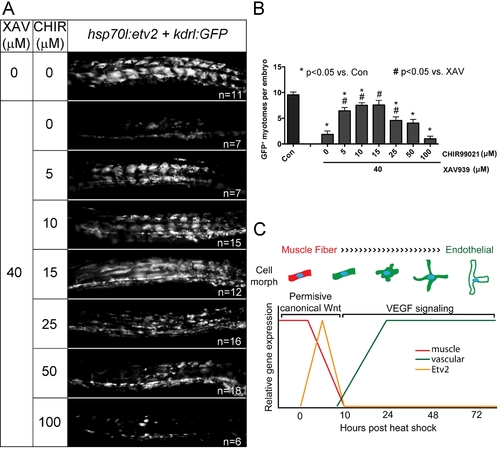Fig. 8
- ID
- ZDB-FIG-130827-16
- Publication
- Veldman et al., 2013 - Transdifferentiation of fast skeletal muscle into functional endothelium in vivo by transcription factor etv2
- Other Figures
- All Figure Page
- Back to All Figure Page
|
A tightly controlled level of Wnt signaling is necessary for muscle to transdifferentiate into endothelial cells. (A and B) Dose-dependent rescue of XAV939 inhibition of kdrl:GFP expression by the addition of Wnt activator CHIR99021. (A) Images of the trunk of 48 hpf embryos following treatment with the noted compounds and heat shock at 24 hpf. Note that 40 μM XAV939 alone almost completely inhibits ectopic GFP expression and the addition of 5–25 μM of CHIR99021 can rescue this inhibition with 15 μM being the most affective dose. CHIR99021 doses greater than 50 μM do not rescue XAV939 inhibition. (B) Quantification of the observations in (A). t test, (*) p<0.05 comparing Control (Con) to drug treated and (#) p<0.05 comparing XAV939 (40 μM) to XAV939 (40 μM) plus varying doses of CHIR99021. (C) Schematic of muscle cell transdifferentiation into endothelial cells. Muscle cells exhibiting permissive levels of canonical Wnt activity are responsive to a pulse of Etv2 expression, resulting in repression of muscle gene expression and initiation of vascular gene expression. Cells expressing vascular genes respond to VEGF signals and change morphology from muscle fiber to thin multibranched and finally to lumenized patent endothelium. |

